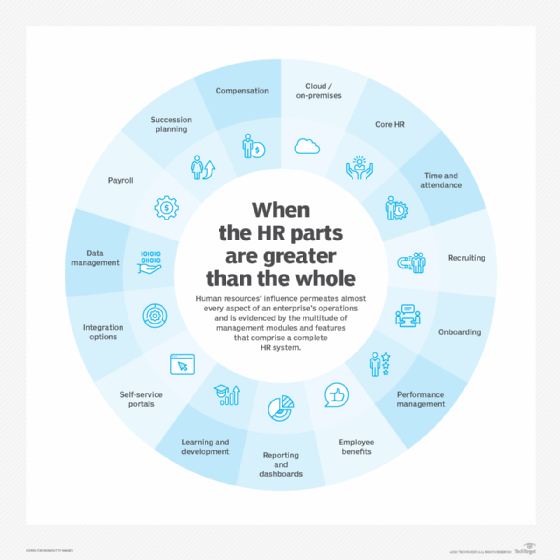What is manager self-service?
Manager self-service is a type of human resource management (HRM) platform that gives supervisors immediate access to employee information and facilitates employee-related actions.
Purpose of a manager self-service tool
With a manager self-service tool, managers can access their direct reports' personnel data, such as time and attendance, leave, benefits, and even performance reviews and rankings. They can then use this information to manage their staff easily, with less time and effort spent on basic tasks.
Supervisors can also use self-service tools to run ad hoc reports and update employee records. These reports and records also provide timely, relevant information for personnel-related decisions. These capabilities make managers more self-reliant and poised to perform a host of human resources transactions and performance management tasks without requiring the intervention of HR or payroll. This aligns with the primary objective of a manager self-service tool, which is to help managers handle labor-related tasks independently.

What are the benefits of using manager self-service?
Manager self-service software gives managers and their organizations some key benefits:
- Easy access to real-time employee data. Managers can retrieve up-to-date employee data from a desktop, laptop, smartphone or tablet. They can then use this data to check timesheets, create work schedules, approve leaves, sign performance reviews, nominate employees for courses or certificates and other tasks. With the necessary data available anytime and from anywhere, they can stay updated on team information and connect with the team readily.
- Time and labor cost savings. Manager self-service portals replace time-consuming paper-based processes and support more transparent communication and user-friendly workflows. Digitization and automation also minimize errors and ensure that both managers and their staff are aligned on important information.
- Increased personnel accountability. Handy access to employee records helps managers hold team members accountable for their work and behaviors.
- Reduced HR workload. Manager self-service reduces the time HR and payroll teams spend on queries from managers and repetitive tasks that managers can handle on their own. The time saved accommodates higher-value HR work.
- Help with the enforcement of company policies. Manager self-service tools enable managers and HR personnel to collaborate on enforcing company policies and standard operating procedures (SOPs). HR can send alerts to let managers know about the dates of upcoming employee performance reviews.
- Advanced compliance reporting. Managers can view the self-service portal’s dashboard for guidance on compliance-related tasks. They can address those tasks to reduce compliance-related risks, including potential regulatory penalties. This matters greatly in strictly regulated industries like healthcare and finance, where noncompliance costs can be huge.
Manager self-service also promotes a better employee experience for managers. The system gives them more autonomy and control. With a self-service tool or portal, team managers no longer need to wait for approval or rely on support from HR or payroll for administrative functions. Information they need to manage employee-related tasks, like leave approvals and timesheet checks, is at their fingertips.
The availability of this information on cloud-native or mobile apps also accommodates necessary changes or updates to direct reports’ courses, certificates, skills, project experience and other work-related data. With this data, managers can lead and mentor their teams more actively. They can also respond quickly to urgent requests from HR or employees, manage remote or hybrid teams easily, and enjoy a better work-life balance.
Findings from HR industry surveys, such as the "Sierra-Cedar HR System Survey," show that organizations that have payroll, a human resources information system (HRIS), and benefits administration in place and then reach some level of administrative excellence for their HR function typically begin to focus on self-service HR technology, such as employee and manager self-service, as well as service delivery technologies like an HR help desk.

Popular manager self-service tools
Many manager self-service tools help managers and supervisors simplify team management tasks. These systems enable managers to access critical employee information on the go, so they're always aware of what’s happening -- and what needs to happen -- with their team. Supervisors and other authorized staff can access detailed reports and metrics that increase their visibility into relevant team-related data and make more informed, transparent and fairer decisions affecting their team members.
Some of the most popular manager self-service tools include the following:
- ADP Mobile. ADP Mobile Solutions, a manager self-service tool, enables managers to access important team data and handle team activities from any mobile device.
- APS. This all-in-one workforce management platform provides alerts and daily digest emails based on real-time data to help managers stay informed continuously. The visual dashboard displays important information about staff attendance, performance reviews and more so that managers can focus on critical details, tasks and deadlines.
- EasyHR. This EHR software offering eases many administrative, operational and staff development tasks through automated features, digital personnel files, reminders, a flexible authorization system, preset workflows and reusable templates.
- Oracle Fusion Cloud HCM. This human capital management (HCM) offering from Oracle includes many manager self-service features supporting a wide range of tasks, like assigning delegates, reviewing employee profiles, performing gap analyses of employees and job competencies, and running reports.
- Paycom. Paycom’s Manager on-the-Go tool is a manager self-service HR software that lets managers handle essential tasks from a simple mobile app. The tool eliminates the need for multiple apps, data reentry and manual reviews and approvals. Many built-in automations simplify workflows and reduce managers’ administrative burden.
- ServiceNow. Within the ServiceNow platform, the Manager Hub feature automates many administrative and managerial tasks. It also provides team data and insights, information about upcoming team events, and customizable plans and templates. All of this enables managers to better manage their time and teams.
- Workday. Workday gives supervisors job, position and compensation data for their employees and provides reports to guide HR-related decisions.
Features of manager self-service tools
Organizations can roll out a manager self-service module either as an HRIS or an entirely separate system. The system can be on-premises or run in the cloud. Some manager self-service modules are accessed on the company's intranet or through a secure web portal. Some tools are also available as mobile apps that let managers log in to their individual accounts securely and perform administrative functions that the software permits.
The most popular, useful manager self-service tools usually include these features:
- Overview of active and inactive staff. This provides greater visibility into staff availability, so supervisors and other leaders can monitor the team and address timely issues.
- Information about staff events. Information about staff events like birthdays and upcoming performance reviews is visible. This simplifies team management and helps managers take actions that can boost employee morale.
- Reports. Up-to-date reports about attendance, timecards, accrual balances, etc., can guide informed decisions about the workforce.
- Alerts. Automated alerts keep managers aligned to tasks that require attention and action, such as upcoming performance reviews.
- Security. Security features like access controls and two-factor authentication maintain user privacy and ensure data protection.
Manager self-service best practices
It is a common practice to roll out an employee self-service system first, adding the manager self-service module progressively in separate phases. Both systems can provide several benefits for users and the organization in terms of cost and operational efficiency, so it’s wise to invest in both.
A manager self-service platform becomes optimal when business needs drive configuration of the base software and features. It can also be useful to introduce self-service features only for selected tasks or transactions that are most important to managers and HR.
A mobile self-service system is desirable in this era of work-from-home models and hybrid teams. Such tools usually enhance the user experience and help managers better meet their responsibilities.
Ideally, the manager self-service tool should be integrated with existing HR systems. This ensures smooth workflows and data exchange. It's also good practice to train all managers on the system. Adequate training and support can increase acceptance and use, which boosts the tool's value and ROI.
Human resource management is key to enterprise success. Learn how to choose the perfect HR software system,






